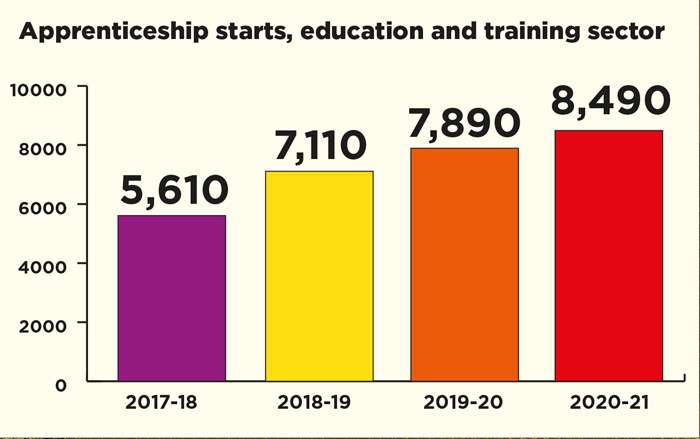Schools are employing apprentice teaching assistants for as little as £4.30 an hour, prompting concerns that some could be “exploiting” the apprenticeships system for cheap labour.
A Schools Week investigation has found that some of the country’s most prominent multi-academy trusts are among those advertising vacancies that pay the minimum legal amount to teaching assistant apprentices. However, the practice is widespread: dozens of local authority-maintained schools are also advertising roles at this rate.
The government told Schools Week that while it was not responsible for setting support staff pay, it “encourages employers to pay more when they can afford to do so”.
The apprentice minimum wage is £4.30 an hour for under-19s and older apprentices in their first year. It is due to rise to £4.81 next year. Over-19s not in their first year must be paid at least the national minimum wage for their age group.
‘It’s exploitative and needs ministerial attention’
It is legal to pay an apprentice the minimum rate. But unions fear the low pay – equivalent to just under £7,000 a year for someone working 40 hours a week on a term-time-only contract – risks becoming exploitative..
However, schools and trusts that employ apprentices have defended the programme, which they say can help those without the necessary skills and experience to become teaching assistants.
Analysis of 227 teaching assistant (TA) vacancies on the government’s Find an Apprenticeship platform found that 183, or about 80 per cent, offered the minimum rate.
The average hourly wage of all the vacancies analysed was £4.64, much less than apprentices more generally are paid. The average hourly wage of level 2 and 3 apprentices nationally was £7.70 in 2018-19, the latest year for which data is available.
Jo Parry, a national officer at UNISON, said schools “shouldn’t be filling vacancies at such exploitative pay rates”, and warned that apprentices were “still learning and should be supported, not used as cheap labour”.
Avril Chambers, a national officer at the GMB union, said apprenticeships could be a valuable route into the profession, “but all too often teaching assistant apprenticeships are exploited as a form of cheap labour”.
She said the GMB was “even aware of cases where minimum wage TA apprenticeships have been advertised at trusts that have cut teaching assistant posts”.
‘A lot of time and support from staff’
At Great Ouseburn Primary School, a local authority-maintained school in York, younger apprentices start on £4.30. But their wage goes up to £6.90 after six months, and to the national minimum wage rate after 12 months.
Nick Oswald, the school’s head, said the scheme was used either to offer young people still living at home the chance to study an alternative to A-levels, or to help career-changers join education without having to pay for a qualification.
He admitted the pay was “not mega bucks by any means, but I think the important thing is it is a training role”.
“We put a lot of time and effort into getting them trained up. If you just see it as a job, yes it’s appallingly-paid and no one should be paid that much. But they’re getting a lot of time and support and expertise from staff in school alongside that.”
Academy trusts seeking apprentice TAs for £4.30 an hour include the David Ross Education Trust (DRET), the Gorse Academies Trust and Ormiston. DRET and Ormiston have in recent years considered support staff redundancies, and Ormiston finished the last year with a surplus of £37.9 million.
The three trusts all operate mostly in the north of England, although dozens of schools in the south also advertised roles at the minimum rate.
‘Most’ apprentices get offered jobs
A spokesperson for DRET said the apprenticeship route was used to bring “those with no relevant work experience into the profession and to grow our own talent”.
“In the vast majority of cases, these apprentices become fully qualified teaching assistants with us who then move on to the regular payscales.”
According to the National Careers Service, the average starting salary for a new non-apprentice TA is £12,621.
A Gorse spokesperson said the trust provided apprentices with “excellent training and offering permanent roles to the vast majority”.
They explained apprentices were “paid less than our non-apprentice teaching assistants, who all have previous experience, a qualification or both, and carry out their work without the need for supervision”.
Ormiston told Schools Week the scheme gave learners “an opportunity to receive comprehensive training and obtain their qualification, while getting first-hand experience of working with young people”.
The trust also said it was “making an active effort as a trust to ensure our apprenticeship offer is as strong as possible, including having salaries that reflect the immense contribution of all our colleagues”.
‘Deep-rooted problems in recruitment and retention’
Dr Mary Bousted, the joint general secretary of the National Education Union, said it “speaks to deep-rooted problems in recruitment and retention as well as long-standing funding challenges within the sector, that schools are now driven to using apprenticeships to fill vacancies”.

Apprentice schemes “have their place”, she said, but her union was “concerned that this does not tip into exploitation or fail to lead to permanent positions”.
There may be awkward questions for bigger academy trusts, whose chief executives tend to have larger salaries.
For example, Gorse chief executive Sir John Townsley’s pay rose to at least £220,000 last year after a £30,000 pay hike. Ormiston’s highest-paid employee earns between £200,001 and £210,000.
A study in 2017 found 75 per cent of TA apprenticeship vacancies were at the legal minimum wage – suggesting schools’ use of the lowest wage has got worse in four years.
Some employers pay more than minimum wage
But some employers pay a lot more than the minimum for TA apprentices.
Ringwood School, in Hampshire, is advertising a role for £11.48 an hour. The school declined to comment.
Schools Week found other examples of schools offering more than the adult minimum wage.
Harris Academy Ockendon recently advertised a position that will pay £6.56 an hour for 18 to 20-year-olds, £8.36 for 21 and 22-year-olds and £8.91 to over-23s.
George McMillan, the school’s executive principal, said the apprenticeship programme allowed for the recruitment of school leavers and graduates “who don’t have the skills or confidence to become a TA but are attracted to the apprentice route as they get high-quality training and a qualification”.
He added that the pay was higher than government guidelines “and we hope that, as well as being fair, this will help attract the best quality candidates”.
The Tandridge Learning Trust recently advertised for an apprentice TA with a starting salary of £12,766.
Paying more ‘shows commitment to local community’
Judith Standen, the trust’s HR manager, said that offering the option of earning a salary while training “makes joining us an attractive proposition for those who might otherwise not be able to access such training”.
“We sometimes find that apprenticeships attract colleagues who are changing career paths to accommodate personal circumstances or realise new ambitions. Providing a fair salary enables the realisation of these aims.”
She said that by offering more than the minimum wage, the trust demonstrated “our commitment to support our local community and to attract the best talent possible in the current employment market”.
The government said the apprentice minimum wage was “designed and set at a rate that acknowledges the particular costs for employers and benefits for young people involved in the provision of apprenticeships”.
Schools still far behind apprentice hiring target
Schools are given incentives to offer apprenticeships. First, all schools and trusts with a pay bill of more than £3 million have to pay into the apprenticeship levy, from which they can then draw down funds to train apprentices.

And from March 2018, schools with more than 250 employees have been expected to recruit 2.3 per cent of their workforce as apprentices every year.
Government data shows apprenticeship starts in the education and training sector have increased from 5,610 in 2017-18 to 8,490 in 2020-21, a rise of more than 50 per cent. Of the starts in 2020-21, the DfE estimates about 6,400 were in schools.
However, the department reported this week that schools have averaged a hiring rate of just 1 per cent since 2017.
















Your thoughts